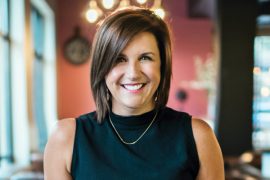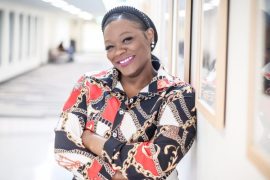By Shayna Mace | Photographed by Hillary Schave
Mawara Sohail, co-owner of Goddard School
Safety and vigilance are of the utmost importance when you’re caring for society’s littlest ones. And through all of the coronavirus craziness last spring — daycares, considered “essential businesses” — had to sort through all of the rules and regulations on the spot regarding staying open while also keeping their buildings safe and sanitized for children and staff for continued use.
“It was a very stressful and busy time [last spring],” says Salman Ahmad, co-owner of Goddard School, a Verona daycare, with his wife, Mawara Sohail. “There were so many unknowns from the government programs, understanding the pandemic, how long this would go on [and] what are the short and long-term prospects. So, there was a lot of research and investigation, collaboration with other Goddard School owners and other childcare centers in Dane County, and trying to understand everything we’d face when we opened back up.”
Ahmad and Sohail opened Goddard School in 2016, so they already had a few years of operation under their belts. The daycare is a national franchise, with 500 locations around the U.S. (three are in Wisconsin).
The couple feel lucky that they owned an established business when the pandemic hit. They admit that if they were a new business, it would have been much more difficult.
Although many daycare centers stayed open continuously during the pandemic, after surveying Goddard’s staff and families, Sohail and Ahmad decided to close the center for two months, until June 1, given the unknowns around the pandemic. Sohail says each classroom teacher provided families with weekly lesson plans throughout the entire closure, to keep kids engaged at home.
Back in mid-March, Goddard School had 182 kids. Now, they have 130 kids based off of Dane County Public Health capacity restrictions, which reduced daycare classroom numbers for ages 21⁄2 and up from 20 down to 15 kids per classroom. (Their infant room capacity stayed the same at only eight babies). The couple also says the number is influenced by “some kids not ready to come back yet in a group care setting.”
The school also had to implement a swath of changes when they reopened, including reducing their center hours by one hour (to accommodate staff schedules); manning each entrance of the daycare with staff who accompany children inside so parents don’t step foot past the entrance; cleaning high-touch areas multiple times daily; keeping children in the same groups all day; having outdoor playtime separated out by classroom; and several other policies. They had to hire two additional staff members just to accommodate all of the extra cleaning.
“We don’t know how long this will go on and what the future will be. This hasn’t been about a profit or anything since the pandemic started. It’s been about staying afloat and helping the staff and families as much as we can. If we break even or even have a manageable loss, I think that we’re very fortunate … we’ve weathered the storm well,” says Ahmad.
Sohail says as hard as the pandemic has been, it’s fostered a sense of togetherness. “[What] worked for us was being supportive to our staff members. We were there when they needed us so we were all here as a team. We always told our staff that we are going to go through this together. Also, [we] looked out for our families — [to] see how we could help and support them. Everybody has to come together as a community … and we’ve been lucky to create a community around this school — and everybody is trying to help each other.”
See more stories from The Ongoing Challenge of COVID-19 here.




